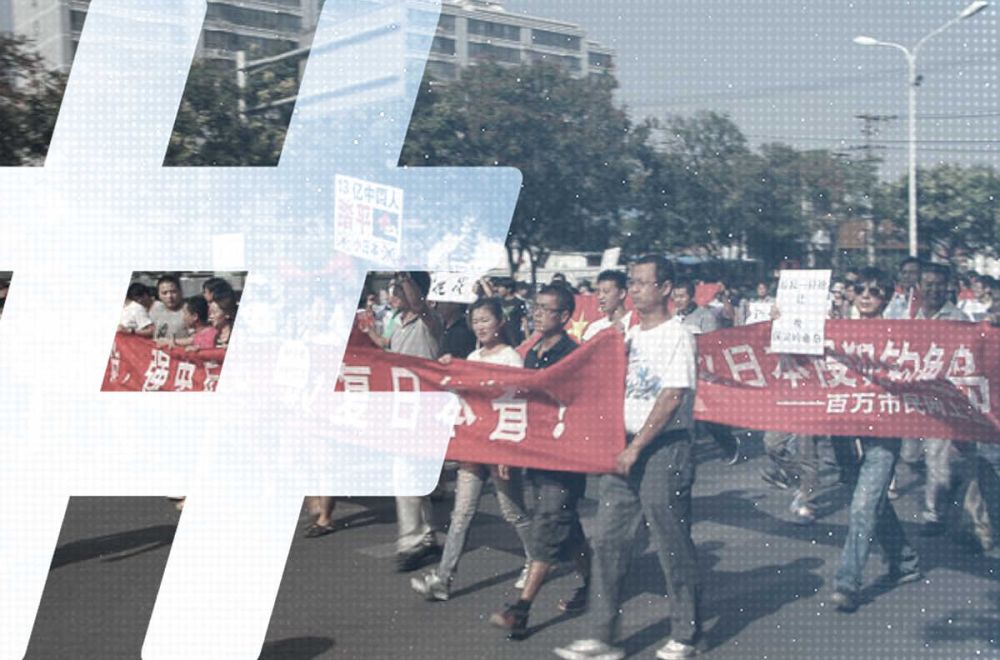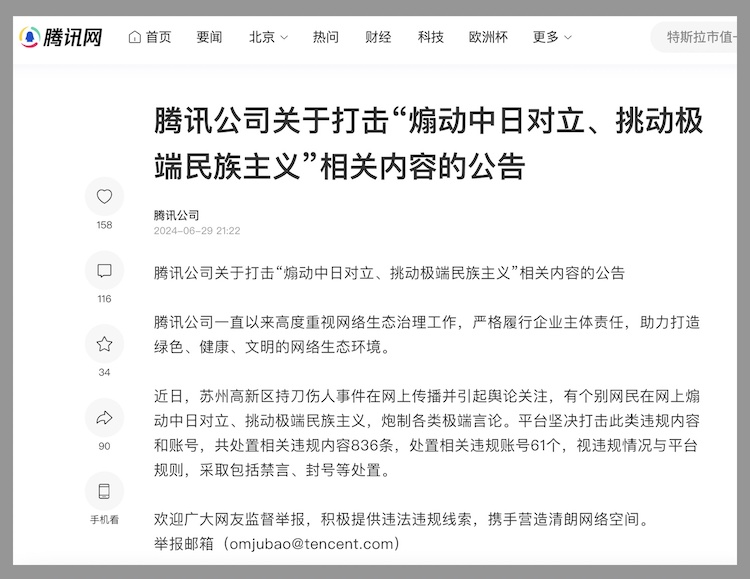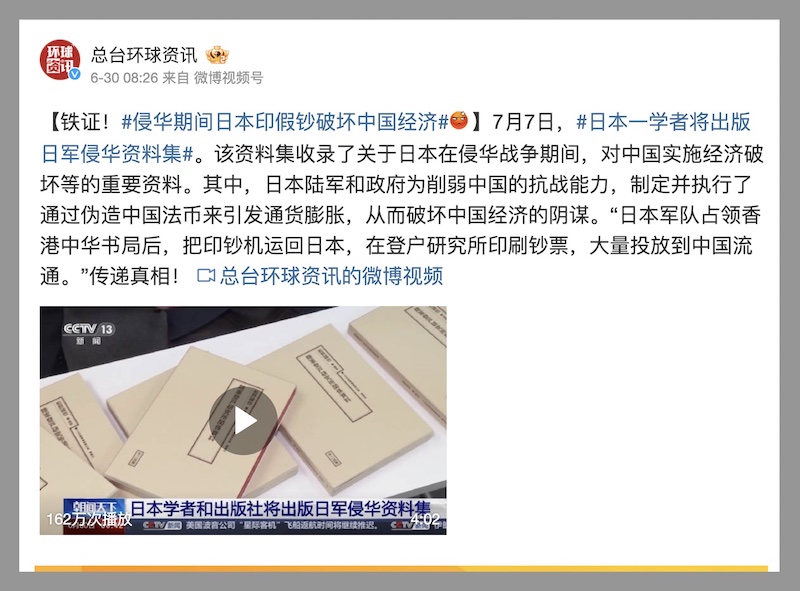
An anti-Japanese march in Beijing in 2012. A sign held above the crowd reads: “1.3 billion Chinese will crush Japan flat!” SOURCE: Wikimedia Commons.
A violent knife attack against a Japanese woman and her child late last month in the city of Suzhou, the second such attack against foreigners in the space of several weeks, unleashed a torrent of xenophobic comments on Chinese social media — some even celebrating the attacker as a hero.
In what Chinese state media portrayed as a full-scale effort to grapple with the problem of violent xenophobia, several platforms issued statements last week condemning the “extreme nationalist” comments users had left under news stories about the Suzhou attack. They included Weibo, Tencent, Phoenix Media, Baidu, and others. But this moment of supposed reflection ignored the deeper roots of extreme nationalism in the public discourse of the Chinese party-state, which for years has nurtured a sense of nationalist outrage over the imagined slights of foreign countries, including Japan in the United States, and has turned the blind eye to extreme nationalist sentiment online.
In its statement on June 29, Tencent said it would “strike out” against language that “incites confrontation between China and Japan and provokes ultra-nationalism.” In language that echoed frequent statements from the Cyberspace Administration of China (CAC), the country’s top internet control body, Phoenix Media pledged to combat extreme nationalism, distortion and exaggeration, and “maintain favorable and orderly information content, and create a clear and bright online environment.”

State media feted these statements of apparent self-reflection and resolve, even as they chastised online platforms for their past lapses. The state-run Global Times, an outlet under the CCP’s official People’s Daily that for decades has made nationalism its primary selling point, condemned social media platforms that have “not only tolerated such content, but have even encouraged it” in a bid to boost views and revenue.
In a post to Weibo, former Global Times editor-in-chief and public opinion leader Hu Xijin said he considered the release of the platform statements as proof of the government’s resolute stance on the issue. He dismissed the forces of extreme nationalism as fringe elements working against cool-headed international engagement: “Right now there are certain extreme voices online that work together to create momentum in public opinion, and this has bewitched some people at the grassroots.”
Grassroots, or Political Roots?
The suggestion by Hu Xijin and others that extreme nationalist voices are noisy exceptions shows an extreme lack of self awareness at the exact moment we are being told that China is in a moment of self-reflection.
In its coverage of the platform statements, Singapore’s Lianhe Zaobao (聯合早報) questioned the assertion from China’s Ministry of Foreign Affairs (MFA) that the incident in Suzhou was “incidental.” The outlet noted that there has been an upsurge in anti-Japanese rumors on China’s internet since last year in particular, and these have followed a broader pattern of xenophobic nationalism. Specifically, rumors were rampant last year that Japanese schools in China are engaged in malicious activities against China’s national interests, including cultivating spies working for Japan.
Despite the talk of incidental nationalism, any regular user of Chinese social media might have the sense that it is awash with nationalist sentiment. And while much of this has no direct affiliation with the state, China’s government has constantly peddled nationalism from center stage. On June 28, as Ministry of Foreign Affairs spokesperson Mao Ning responded to a question about the Suzhou incident, she held up the tragic death of Hu Youping (胡友平), the Chinese bus driver who died defending the Japanese woman and her child, as evidence of “the spirit of the Chinese people to act bravely and help others.” This remark set the tone for state media coverage that day.
Despite the talk of incidental nationalism, any regular user of Chinese social media might have the sense that it is awash with nationalist sentiment.
In the question immediately preceding the one about Suzhou, however, Mao Ning was asked by a broadcast reporter for state media what the government’s response was to the latest release of treated nuclear wastewater from the Fukushima Daiichi nuclear power plant. Mao responded with typical sternness on an issue that the Chinese government has played up endlessly to its public, despite findings from the UN’s International Atomic Energy Agency and others that the release meets with international safety standards. “The Japanese side’s insistence on transferring the risk of nuclear contamination to the whole world through the discharge of nuclear contaminated water into the sea constitutes a blatant disregard for the health of all humankind,” said Mao.
But the most important indication that China’s soul-searching over extreme nationalism is a momentary ripple in the ongoing pattern of state-driven nationalist sentiment comes in the continued coverage in the country’s state media.

On June 30, the day after Tencent’s pledge to strike out against those “inciting confrontation between China and Japan (煽动中日对立), China’s flagship state broadcaster CCTV promoted a story on Weibo about Japan’s use of counterfeit currency to destabilize China’s economy ahead of its invasion in the 1930s. While the broadcast report was not particularly sensational in its approach, it drove forward a theme familiar to media consumers in China — that the indignities committed by Japan nearly a century ago are clear and present for all Chinese today.
If any Chinese Weibo users were in doubt about what they should feel in response to the CCTV story, the post from CMG Global News (总台环球资讯) — an official account for the CCP’s China Media Group that has more than 48 million followers — was enough to get any user steaming. “Ironclad evidence!” it began, before adding a bright red angry face emoticon, and the hashtag: “Japan printed counterfeit banknotes during its invasion to devastate China’s economy!”
Social media platforms may be feeling the heat over the recent outpouring of extreme nationalism. But the real lesson here is one of moral confusion — that nationalism is to be encouraged until it embarrasses the leadership.




















